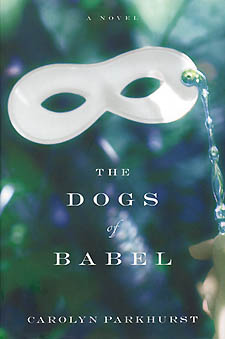Ways with Words
The Dogs of Babel
A softly lit Carnival mask, dappled in blue-green garden light, adorns the cover of Carolyn Parkhurst’s debut novel The Dogs of Babel. Masks — the masks people use to disguise themselves, to re-imagine themselves and to avoid dealing with life’s hardest moments — are an important key to the novel’s heart. Parkhurst’s novel is an exploration of grief, a lyrical work combining clean language, creative wordplay, and numerous social, cultural and mystical references to plumb the depths of a husband’s terrible loss.
The novel features three deeply compelling characters — Paul Iverson, his wife Lexy, and their dog Lorelei. On a bright October afternoon, Paul calls home and is met with the news that a terrible accident has occurred. Lexy is dead. He soon discovers that she has fallen, jumped or been pushed from a tree in their yard. Their dog — formerly her dog — Lorelei barks wildly, panicked, voicing the grief that Paul cannot face. He resolves, after finding a series of “anomalies ” at home — a rearranged shelf of books and a steak apparently cooked just for the dog — that he must teach Lorelei to speak because only she can reveal how Lexy truly died. The entire novel is an excavation of Paul’s memory — his personal journey through the loss of his beloved wife, and the unusual, potentially destructive lengths he will go to in order to understand her death.
 |
The Dogs of Babel alternates between the present tense story of Paul’s grief and work with Lorelei — the story that begins with Lexy’s death on the first page — and the tale of Lexy and Paul. That story begins, joyously, with a yard sale, Disneyland, and square-cut hard boiled eggs. Still, theirs is not a perfect relationship; both Paul and Lexy are as difficult as they are compelling, and the reader discovers a great deal about both of them as the narrative unfolds. Parkhurst does a crackerjack job here — at times, The Dogs of Babel reads like a good murder mystery. A reader is likely at least once to gasp at a revelation or turn of events. And yet, for all its suspense, the heart of this novel is quietly complex.
One of the joys of The Dogs of Babel is the regular unveiling of unexpected, creative references. Paul is a linguist and “Lexy ” suggests lexicon: a dictionary, special vocabulary, or book of words. At one point in his research, he begins breaking apart and reconstructing important names, and “Paul, ” “Lexy, ” “Lorelei, ” and “Remo ” all take on new, underlying meaning. The mythological connotations of “Lorelei ” (while already familiar to some) are revealed, effectively, in a deftly written scene late in the novel. Those mythological references, along with folktales, dream interpretation, ghost stories, a 1-800-Psychic line and tarot cards, mask-making, underground societies, and Sergeant Peppers Lonely Hearts Club Band are only a few of the usually lovely and occasionally chilling digressions that populate Paul’s search for an understanding of Lexy’s death.
|
There are a few points in the novel when the language describing love, loss, passion, or grief falls into cliché. Those soft-spots, however, are rare. Clearly, Parkhurst is fully capable of navigating this emotional terrain, and — most thrilling — of making it entirely new. There are many masks in The Dogs of Babel, but Parkhurst successfully layers the novel’s impressions and inspirations until a beautiful, artful conclusion is ultimately revealed.
The Dogs of Babel is a stirring novel about the search for peace through an assemblage of symbols, rearranged books, the history of a redemptive relationship, and the depths of a beloved dog’s caring black eyes.
Advertisement
|
Support Metro Weekly’s Journalism
These are challenging times for news organizations. And yet it’s crucial we stay active and provide vital resources and information to both our local readers and the world. So won’t you please take a moment and consider supporting Metro Weekly with a membership? For as little as $5 a month, you can help ensure Metro Weekly magazine and MetroWeekly.com remain free, viable resources as we provide the best, most diverse, culturally-resonant LGBTQ coverage in both the D.C. region and around the world. Memberships come with exclusive perks and discounts, your own personal digital delivery of each week’s magazine (and an archive), access to our Member's Lounge when it launches this fall, and exclusive members-only items like Metro Weekly Membership Mugs and Tote Bags! Check out all our membership levels here and please join us today!























